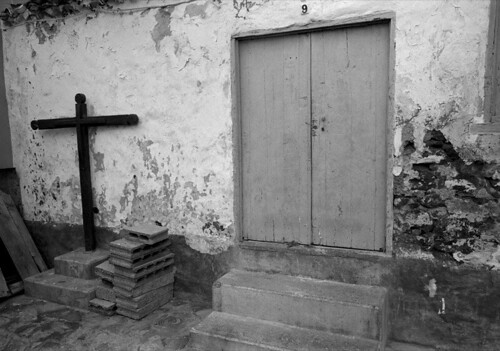
Sometimes an article appears in the New York Times that is so bad, I wonder really whether the editors read it. Such is the case with Helene Cooper's article, "The Best We Can Hope For" in the Week in Review section of the Sunday edition on 01/14/07. Cooper attempts to suggest that the Spanish Civil War provides a hopeful model for the end of the Iraq War - in short, that the war would remain an Iraq War and not become a regional or global conflict. I was so astonished at the simple-mindedness of this article, that I could barely write a letter to the New York Times. The worst articles are always the most difficult to object to concisely, because they usually are bad in a mind-bendingly three-dimensional manner and their rebuttal seems always to include repeating verbatim the entire history of the twentieth century. Just so, this article by Helene Cooper. I include my attempt to respond to its weaknesses below.
~
Dear Editor:
Helene Cooper's article is astonishingly bad, even for the New York Times. Apart from the flippant cocktail-party tone taken about subjects as serious as the Spanish Civil War and the Iraq War, she insists on missing her own points. To quote:
"But, in the end, the Spanish Civil War stayed Spanish. The Europeans sent money and arms and even volunteers, but they didn’t let the war engulf the continent. (Probably because the continent was busy getting engulfed in World War II, but let’s not be too technical.)"
Huh? So in history, what actually happened is merely a technicality?
Regardless, she continues by warning that somehow we risk turning the Middle East into a nuclear conflagration or merely a world war by not increasing the numbers of troops in the area. Somehow by devoting more troops to the conflict we will keep the Iraq War in Iraq, just as the Spanish War kept the conflict Spanish, thereby averting another world war of some sort. But back to the mere technicalities of history - wasn't the Spanish Civil War followed by World War II? So really, to follow Cooper's logic (which she herself seems reluctant to do, probably because it doesn't make any sense) what we need to keep the conflict in Iraq IN Irag is another world war, just like the one that followed the Spanish Civil War.
Nice.
The Spanish Civil War involved players from all sides of the future conflict that became World War II. Many of these players are also actively involved in the Iraq War - anti-fascists, industrialists, weapons manufacturers, world powers, etc. Even the rhetoric in the speeches is similar - compare those of Franco with those of President Bush and you will find some (shocking) similarities in the use of The Enemy as a pry-bar on their respective countries' sense of democracy and civil justice. The true horror of the Spanish Civil War was the lack of enough tactical and material superiority on either side to end the war quickly. Instead it dragged on for a couple extra years while the fractious combatants bludgeoned each other, killing hundreds of thousands of people in the process. The half-interested intervention of world powers did much to prolong the conflict and prevent a negotiated peace earlier than it occurred. As a civil war, the situation in the Spanish Civil War is closer to that in the Yugoslavian Wars than it is to that of the Iraq War, which is basically a war of imperialist intervention and why it is dangerous regionally.
The Iraq War is dangerous not because it might spread to other countries, but because the Bush administration is trying to prevent the spread of the Iraq War into other countries (and thus ensure its own petro-economic agenda) by keeping other countries from being involved in the solution to the problems in Iraq. Because Iran, Syria and Saudi Arabia are not involved in the process of creating a peaceful Iraq, they can only distrust any goal that the United States, a (non-Muslim, pro-Israel) foreigner in the region, may have for that peace. Iran fought a long and costly war against Iraq it does not want repeated. Syria sees an American-backed government in Baghdad as a direct threat to its dictatorship, especially since Bush keeps trumpeting the exportation of democracy. Saudi Arabia watched Iraq overrun Kuwait and sees the fate of minority Sunnis as its responsibility in the region. The House of Saud cannot maintain face in the Arab world and allow Sunnis to be killed simultaneously. Keeping all of these countries out of the deal guarantees that each country will seek influence individually in order to ensure their strategic interests are maintained through whatever means possible. The Bush administration needs to involve these countries in order to make certain that what peace can be achieved in the region has the blessings of all parties. Otherwise, nothing but instability will be the result. The Iraq War cannot remain Iraqi. It involves all the other countries in the region already.
And then there are the Kurds and the Turks.
In the end, Helene Cooper's article just seems incredibly shallow and naive, perhaps even slightly malformed. I would suggest the more active participation of an editor in the future.
Sincerely,
J Ake
~
I know, I shouldn't snipe at the editors. But really, the editors at the New York Times are just not paying attention. If Cooper's piece is an Op-Ed, then the article should be in a different section. If the piece is an analysis, it should take that tone and honor the presence of historical information, not denegrate it to mere technicality.
If you would like a good book on the Spanish Civil War (and one that gives good examples of the rhetorical approach of Franco that you can compare to the speeches of Bush and his pals) check out Anthony Beevor's The Battle for Spain: The Spanish Civil War, 1936-1939.